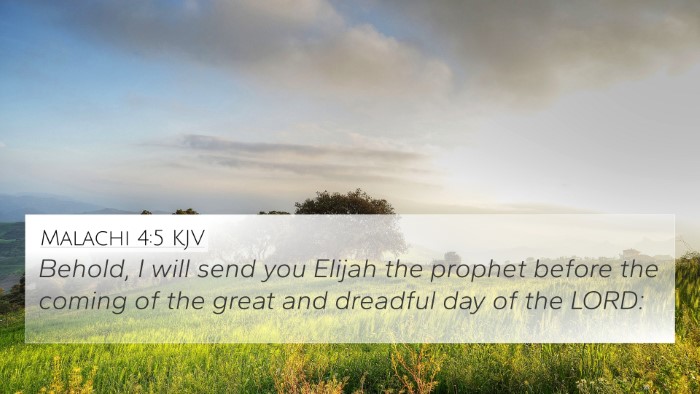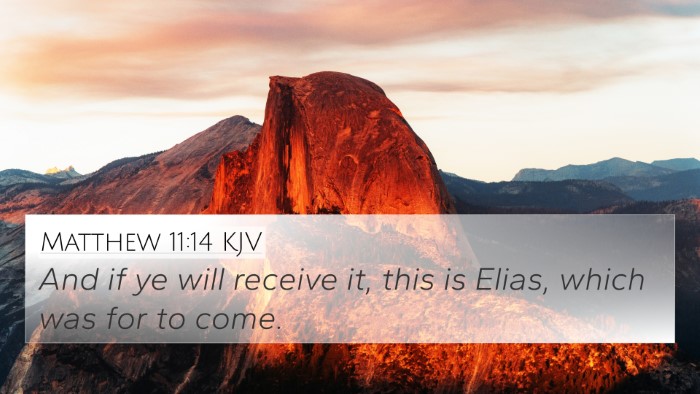Understanding Mark 9:11
Verse: "And they asked him, saying, Why say the scribes that Elijah must first come?" (Mark 9:11)
Verse Summary
In Mark 9:11, the disciples inquire about the necessity of Elijah's coming before the Messiah. Their question reflects their struggle to reconcile their expectations of prophetic fulfillment with the teachings of Jesus regarding the end times and the coming of the kingdom of God.
Commentary Insights
- Matthew Henry: Henry notes that the disciples' question arises from a misunderstanding of the prophetic writings. The expectation that Elijah must return stems from Malachi 4:5-6, which speaks of Elijah coming before the great and dreadful day of the Lord. Henry emphasizes that the real Elijah has already come in the form of John the Baptist, who prepared the way for Christ.
- Albert Barnes: Barnes argues that the inquiry reflects a common expectation among the Jewish people, derived from the teachings of the scribes. He explains that Elijah’s role was to restore all things and indicates the significance of his coming as a precursor to the Messianic age. This verse invites further theological reflection on how spiritual restoration aligns with Christ's ministry.
- Adam Clarke: Clarke elaborates on the necessity of understanding biblical prophecies in their proper context. He connects the question of Elijah to the broader narrative of redemption and restoration outlined in the Old Testament. He suggests that the “coming” of Elijah signifies the transition from the old covenant to the new covenant established by Jesus.
Thematic Connections
Mark 9:11 is interconnected with several biblical themes and prophecies. Below are notable connections:
- Malachi 4:5-6: This passage prophesies Elijah's return, which serves as a basis for the disciples' question.
- Matthew 17:10-13: Parallel to Mark 9:11, this account elaborates on the identity of Elijah and confirms that John the Baptist fulfilled this role.
- Luke 1:17: Here, the angel Gabriel speaks of John the Baptist coming in the spirit and power of Elijah, highlighting the thematic link of prophetic fulfillment.
- Isaiah 40:3: The voice crying in the wilderness represents the work of John the Baptist in preparing the way for Jesus, connecting Elijah's role to the advent of Christ.
- John 1:21: This verse contains a direct inquiry about the identity of John the Baptist, further cementing the connection between Elijah and Gospel narrative.
- Acts 3:21-23: Peter references the restoration of all things, paralleling the theme of prophetic fulfillment and linking Elijah's coming with eschatological expectations.
- Revelation 11:3-6: The chapter discusses the two witnesses, interpreted by some as symbolic of Moses and Elijah, reinforcing the themes of prophecy and divine witness.
- Matthew 16:13-17: Jesus' recognition of Peter’s confession points to the revelation of His identity as the Christ, further connecting the theme of prophetic fulfillment.
- Romans 11:2-5: Paul discusses the remnant of Israel, echoing the prophetic threads of restoration and the enduring significance of prophecy in the New Testament context.
Cross-Referencing and Thematic Analysis
The verse serves as a critical point for cross-referencing and understanding the connections between various biblical texts. By employing tools for Bible cross-referencing, such as concordances or Bible cross-reference guides, scholars and readers can explore these relationships further:
- Understanding Prophecy: Explore the links between Old Testament prophecies and their New Testament fulfillments.
- Identifying Connections: Delve into the connections between the Gospels, highlighting how different authors reflect on similar events.
- Comparative Study: Engage in a comparative study of the Pauline epistles to gain insights into themes of prophecy and fulfillment.
- Inter-Biblical Dialogue: Analyze how the teachings of the prophets dialogue with apostolic teachings in the New Testament.
Conclusion
Mark 9:11 raises significant questions regarding the necessity of Elijah's coming and relates to broader themes of prophecy, fulfillment, and the establishment of the kingdom of God. By examining this verse through cross-references and thematic analysis, a more profound understanding of the narrative and theological implications emerges.
Further Bible Study Resources
For those interested in enhancing their study of Mark 9:11 and related scriptures, consider utilizing:
- Bible concordances to find cross-references
- Comprehensive Bible cross-reference materials for deeper insights
- Bible chain references to explore interconnected themes and ideas
The exploration of scriptures and their interconnections can enrich one's spiritual journey, offering new perspectives and understanding of God's narrative through the Bible.







